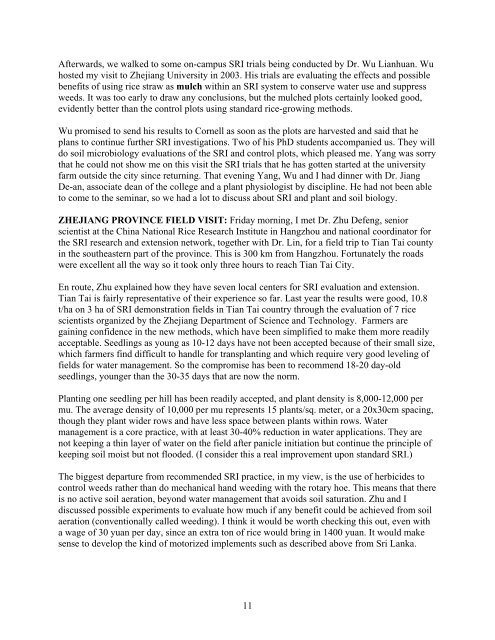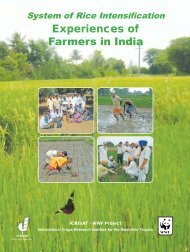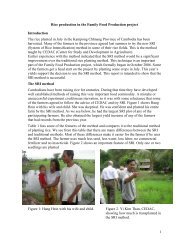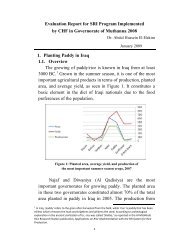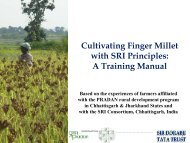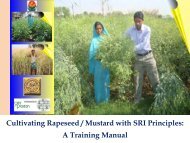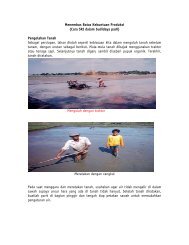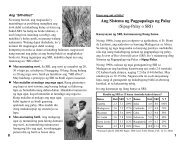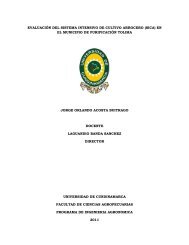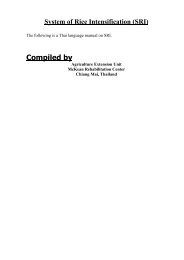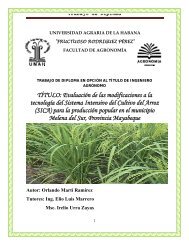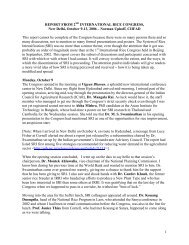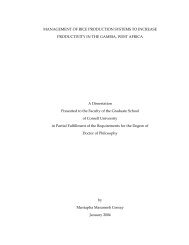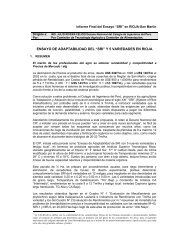Report from SRI China visit - The System of Rice Intensification ...
Report from SRI China visit - The System of Rice Intensification ...
Report from SRI China visit - The System of Rice Intensification ...
You also want an ePaper? Increase the reach of your titles
YUMPU automatically turns print PDFs into web optimized ePapers that Google loves.
Afterwards, we walked to some on-campus <strong>SRI</strong> trials being conducted by Dr. Wu Lianhuan. Wu<br />
hosted my <strong>visit</strong> to Zhejiang University in 2003. His trials are evaluating the effects and possible<br />
benefits <strong>of</strong> using rice straw as mulch within an <strong>SRI</strong> system to conserve water use and suppress<br />
weeds. It was too early to draw any conclusions, but the mulched plots certainly looked good,<br />
evidently better than the control plots using standard rice-growing methods.<br />
Wu promised to send his results to Cornell as soon as the plots are harvested and said that he<br />
plans to continue further <strong>SRI</strong> investigations. Two <strong>of</strong> his PhD students accompanied us. <strong>The</strong>y will<br />
do soil microbiology evaluations <strong>of</strong> the <strong>SRI</strong> and control plots, which pleased me. Yang was sorry<br />
that he could not show me on this <strong>visit</strong> the <strong>SRI</strong> trials that he has gotten started at the university<br />
farm outside the city since returning. That evening Yang, Wu and I had dinner with Dr. Jiang<br />
De-an, associate dean <strong>of</strong> the college and a plant physiologist by discipline. He had not been able<br />
to come to the seminar, so we had a lot to discuss about <strong>SRI</strong> and plant and soil biology.<br />
ZHEJIANG PROVINCE FIELD VISIT: Friday morning, I met Dr. Zhu Defeng, senior<br />
scientist at the <strong>China</strong> National <strong>Rice</strong> Research Institute in Hangzhou and national coordinator for<br />
the <strong>SRI</strong> research and extension network, together with Dr. Lin, for a field trip to Tian Tai county<br />
in the southeastern part <strong>of</strong> the province. This is 300 km <strong>from</strong> Hangzhou. Fortunately the roads<br />
were excellent all the way so it took only three hours to reach Tian Tai City.<br />
En route, Zhu explained how they have seven local centers for <strong>SRI</strong> evaluation and extension.<br />
Tian Tai is fairly representative <strong>of</strong> their experience so far. Last year the results were good, 10.8<br />
t/ha on 3 ha <strong>of</strong> <strong>SRI</strong> demonstration fields in Tian Tai country through the evaluation <strong>of</strong> 7 rice<br />
scientists organized by the Zhejiang Department <strong>of</strong> Science and Technology. Farmers are<br />
gaining confidence in the new methods, which have been simplified to make them more readily<br />
acceptable. Seedlings as young as 10-12 days have not been accepted because <strong>of</strong> their small size,<br />
which farmers find difficult to handle for transplanting and which require very good leveling <strong>of</strong><br />
fields for water management. So the compromise has been to recommend 18-20 day-old<br />
seedlings, younger than the 30-35 days that are now the norm.<br />
Planting one seedling per hill has been readily accepted, and plant density is 8,000-12,000 per<br />
mu. <strong>The</strong> average density <strong>of</strong> 10,000 per mu represents 15 plants/sq. meter, or a 20x30cm spacing,<br />
though they plant wider rows and have less space between plants within rows. Water<br />
management is a core practice, with at least 30-40% reduction in water applications. <strong>The</strong>y are<br />
not keeping a thin layer <strong>of</strong> water on the field after panicle initiation but continue the principle <strong>of</strong><br />
keeping soil moist but not flooded. (I consider this a real improvement upon standard <strong>SRI</strong>.)<br />
<strong>The</strong> biggest departure <strong>from</strong> recommended <strong>SRI</strong> practice, in my view, is the use <strong>of</strong> herbicides to<br />
control weeds rather than do mechanical hand weeding with the rotary hoe. This means that there<br />
is no active soil aeration, beyond water management that avoids soil saturation. Zhu and I<br />
discussed possible experiments to evaluate how much if any benefit could be achieved <strong>from</strong> soil<br />
aeration (conventionally called weeding). I think it would be worth checking this out, even with<br />
a wage <strong>of</strong> 30 yuan per day, since an extra ton <strong>of</strong> rice would bring in 1400 yuan. It would make<br />
sense to develop the kind <strong>of</strong> motorized implements such as described above <strong>from</strong> Sri Lanka.<br />
11


